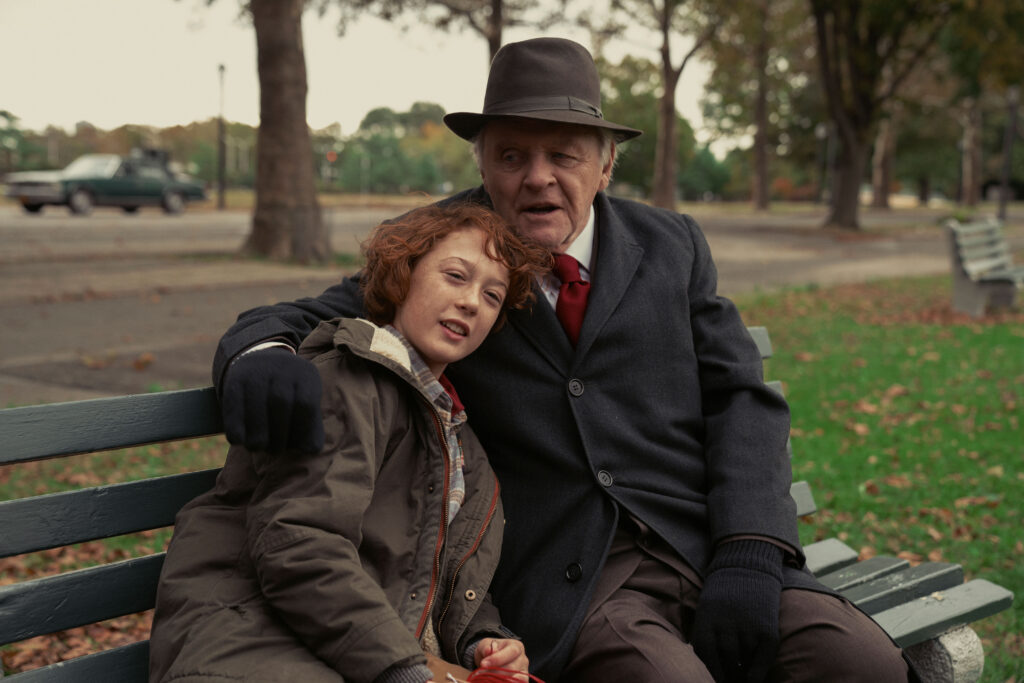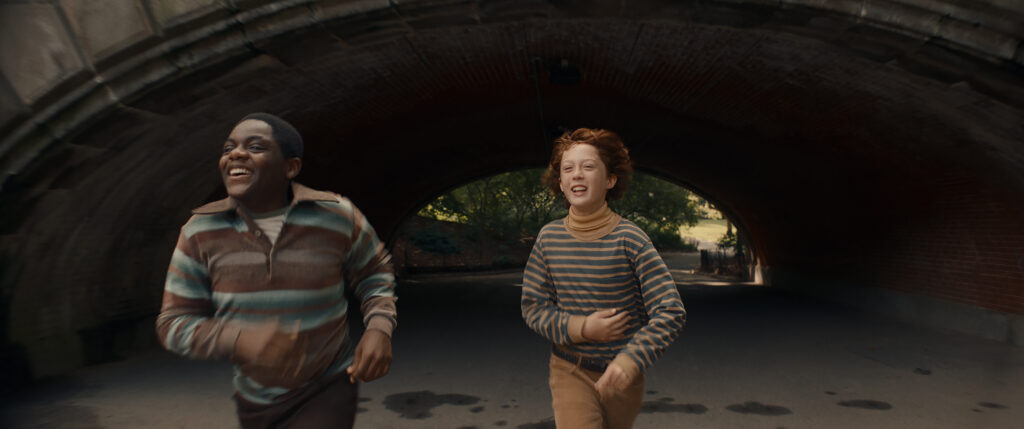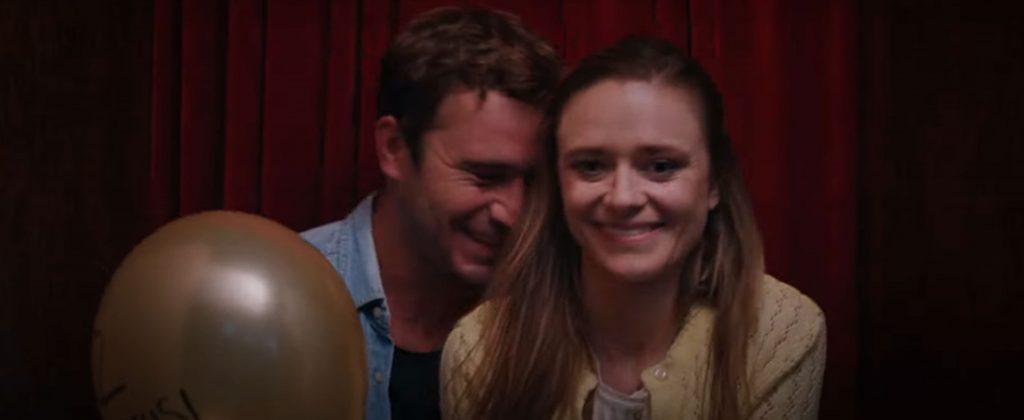October 30, 2022
by Carla Hay

Directed by James Gray
Culture Representation: Taking place in 1980 in New York City, the dramatic film “Armageddon Time” (inspired by director James Gray’s own childhood) features a predominantly white cast of characters (with a few African Americans) representing the working-class, middle-class and wealthy.
Culture Clash: An 11-year-old, middle-class Jewish boy, who befriends a working-class African American boy from school, learns some of life’s harsh lessons about bigotry and privilege.
Culture Audience: “Armageddon Time” will appeal primarily to people interested in retro movies that explore the loss of innocence in childhood.

The talented cast’s performances elevate “Armageddon Time,” a drama that apparently wants to condemn racism, antisemitism and social class snobbery. Ultimately, the movie doesn’t have anything new to say about people who enable these types of bigotry. The cast members’ acting should maintain most viewers’ interest, but parts of “Armageddon Time” (written and directed by James Gray) might annoy or bore viewers who feel like they’ve seen this type of “loss of childhood innocence experienced by a future movie director” many times already.
That’s because there have been several movie directors who’ve done movies based on their real childhoods, with the childhood versions of themselves as the protagonists of the movies. In these semi-autobiographical or autobiographical films, these directors depict their childhood selves as inquisitive, imaginative and often misunderstood by many people around them. The child has at least one parent who usually doesn’t encourage the child’s artistic inclinations, because the parent thinks it’s not a good career choice to be any type of artist.
All of these clichés are in “Armageddon Time,” Gray’s dramatic retelling of what his life was like for a pivotal two-month period when he was 11 years old. “Armageddon Time”—which takes place from September to November 1980, mostly in New York City’s Queens borough—can be considered semi-autobiographical, because the characters in the movie are based on real people without using the real people’s names, except for members of Donald Trump’s family. At a certain point in the movie, viewers can easily predict where this movie is going and what it’s attempting to say.
However, because the cast members deliver good performances and have believable chemistry with each other, “Armageddon Time” has moments that can be entertaining and compelling. “Armageddon Time” had its world premiere at the 2022 Cannes Film Festival in France. The movie then made the rounds at several other film festivals in 2022, including the Telluride Film Festival in Colorado, the Zurich Film Festival in Switzerland, and the New York Film Festival in New York City.
The story is told from the perspective of 11-year-old Paul Graff (played by Banks Repeta, also known as Michael Banks Repeta), who has talent for drawing illustrations of people. Paul has a mischievous side where he makes caricatures or illustration parodies of people he knows. He’s also a science-fiction enthusiast who has created an original superhero character named Captain United.
In the beginning of the movie, it’s September 8, 1980—Paul’s first day of school as a sixth grader at P.S. 173, a public school in Queens. One of the first things that happens in a classroom led by a cranky teacher named Mr. Turkeltaub (played by Andrew Polk) is that Mr. Turkeltaub has found a drawing that depicts him as a turkey. An infuriated Mr. Turkeltaub demands to know who made the drawing, and Paul eventually confesses that he did it.
Just a few minutes later, a classmate named Johnny Davis (played by Jaylin Webb) tells a harmless joke as a reply to the teacher’s question. Johnny’s flippant response gets Mr. Turkeltaub even angrier. He hisses at Johnny as he points to Johnny’s head, “You’ve got nothing up here.” Johnny snaps back, “Look who taught me.”
Paul and Johnny both get mild punishments for their disobedience, as Mr. Turkeltaub orders them to clean the chalkboard in the classroom. Johnny and Paul become very fast friends from this shared bonding experience. Their friendship is defined by a lot of the rebellious things that they do together.
Johnny and Paul also share a passion for outer space. Johnny dreams of becoming an astronaut for NASA, while Paul wants to illustrate comic books about space travel. Although both boys talk about a lot of things with each other immediately, they’re not as up front about each other’s home lives when they first meet.
Paul’s family is middle-class, but he lies to Johnny by saying that his family is rich. Johnny, who doesn’t like to talk about his parents, comes from a low-income household and lives with his grandmother (played by Marjorie Johnson, in a quick cameo), whom Johnny describes as “forgetful.” (It’s implied that she has dementia.) Eventually, Johnny opens up to Paul about what’s really going on with him at home, but Paul keeps up the lie about his parents being rich for as long as Paul can keep telling this lie.
Paul’s tight-knit family at home consists of his energetic mother Esther Graff (played by Anne Hathaway), who is the president of P.S. 173’s Parent Teacher Association; his stern father Irving Graff (played by Jeremy Strong), who is an engineer; and Paul’s smug older brother Ted Graff (played by Ryan Sell), who is about 15 years old and almost the opposite of Paul. Ted is a popular, outgoing student at his private school, and he gets good grades. Paul is introverted, somewhat of a loner, and an average student, even though he has the intelligence to get better grades in school. Paul is much closer to his mother than he is to his father, who has a bad temper and tells Paul that being an artist is not a wise occupation.
Frequent visitors to the Graff home for family dinners are Paul’s grandparents, aunts and uncles. Esther’s father Aaron Rabinowitz (played by Anthony Hopkins), who is from the United Kingdom, is Paul’s favorite of these relatives. Grandfather Aaron is kind and patient with Paul, who feels like Aaron is the only family member who truly accepts Paul for who Paul is. Aaron is also the only one in this family who teaches Paul the realities of antisemitism and racism and how not to be a bigot.
Many of the Graff/Rabinowitz family members, including Aaron, are originally from Europe and survivors of the Holocaust. Aaron’s mother was a Ukrainian refugee who eventually settled in England. Aaron and his wife Mickey Rabinowitz (played by Tovah Feldshuh) are both retired schoolteachers. Other relatives who are in the story are Paul’s aunt Ruth (played by Marcia Haufrecht) and uncle Louis (played by Teddy Coluca), who are both very opinionated.
Family conversations around the dining room table reveal that although members of this family have experienced prejudice for being Jewish, many of the adult family members are racists who don’t like black people. Some of the family members are more blatant about this racism than others. Aaron is the only adult in the family who doesn’t come across as some kind of bigot or difficult person. He’s not saintly, but the movie depicts Aaron as the only adult who comes closest to having a lot of wisdom and a strong moral character.
Meanwhile, at school, Johnny and Paul get into some more mischief. In Mr. Turkeltaub’s class, Johnny tends to get punishment that’s worse than what Paul gets. Johnny is a year older than his classmates because he’s had to repeat sixth grade. Johnny usually get blamed first by Mr. Turkeltaub if there’s any student trouble in the classroom.
It doesn’t help that Johnny sometimes curses at the teacher in response to being singled out as a troublemaker, whereas Paul tends not to go that far with his disrespect for authority. However, Mr. Turkeltaub seems to deliberately pick on Johnny to get him angry. There are racial undertones to the way that Mr. Turkeltaub treats Johnny, who is one of the few African American students in the class.
Through a series of events and circumstances that won’t be revealed in this review, Paul transfers to the same private school where Ted is a student: Kew-Forest School, located in the affluent neighborhood of Forest Hills, Queens. Paul is very unhappy about this transfer because he will no longer get to see Johnny at school. Paul also experiences culture shock, because most of the students come from upper-middle-class and wealthy families.
Members of the real-life Trump family are major financial donors to Kew-Forest School and sometimes stop by the school to make speaking appearances to the assembled students. “Armageddon Time” shows Fred Trump (Donald Trump’s father, played by John Diehl) and Maryanne Trump (Donald Trump’s older sister, played by Jessica Chastain) in cameos, as they give condescending lectures disguised as pep talks at Kew-Forest School. Maryanne Trump, who inherited her fortune from her father, even has the gall to say in her lecture that she worked hard for the wealth that she has.
Because “Armageddon Time” writer/director Gray didn’t change the names of Fred Trump and Maryanne Trump in the movie, the only conclusion that viewers can come to is that Gray wanted to show some kind of disdain for the Trumps in the movie, by depicting them as out-of-touch rich people whom he did not like or trust, even as a child. The only other semi-political statements made in “Armageddon Time” are scenes where the 1980 U.S. presidential election is in the news and discussed in the Graff family home. Irving and Ethel Graff are Democrats who want incumbent Democrat president Jimmy Carter, not Ronald Reagan (a Republican), to win the election.
Because “Armageddon Time” takes place during the height of the nuclear arms race between the United States and Russia (then known as the Soviet Union), the movie makes some references to the fear that many people had that a nuclear war could be imminent and would cause an apocalypse. In the production notes for “Armageddon Time,” Gray says that the movie’s title was named after the reggae song “Armagidion Time,” which had a cover version released by The Clash in 1979. (The Clash’s remake of this song is in the “Armageddon Time” movie.) Gray further explains in the production notes that the movie is about Paul’s personal Armageddon.
It’s during Paul’s experiences as a new student at Kew-Forest School that he begins to understand how race, religion and social class are used as reasons for bigots to inflict damaging prejudice on others. When Johnny shows up near the Kew-Forest School playground to talk to Paul, it’s the first time that Paul is fully aware that many of his peers at Kew-Forest school look down on someone like Johnny, just because Johnny is a working-class African American. One of the Kew-Forest students uses the “n” word to describe Johnny, and Paul is shocked.
Paul’s mother Esther also disapproves of Johnny, mainly because she blames Johnny for being a “bad influence” on Paul. There are some racial undertones to Esther’s dislike of Johnny, mainly because Esther wants to deny that Paul is a willing and active participant in whatever rebellious and rude antics that he and Johnny decide to do. Paul, who has an angelic face, is not as “innocent” as Esther thinks he is.
Repeta skillfully plays the role of Paul, a boy who starts to see life in ways that Paul did not expect. His performance is an admirable anchor for the movie, which at times is hindered by writer/director Gray’s self-indulgent nostalgia. And although Hathaway and Strong give solid performances as Esther and Irving, Paul’s emotional connections to his parents at this particular time in Paul’s life are secondary to the emotional connections that Paul has with his grandfather Aaron and with his new friend Johnny. Hopkins and Webb deliver fine performances as Aaron and Johnny, but much about how these two characters are written (the wise grandfather and the rebellious kid) are reminiscent of characters seen in many other movies.
One of the problematic elements of “Armageddon Time” is that Johnny is often treated as a “black token” in the movie. He has all the negative stereotypes of what many racists think black boys are: troublemakers who can’t be as accomplished or as intelligent as their white peers. It would have been better if the movie had at least a few other African American people in prominent speaking roles for some variety (after all, this movie takes place in racially diverse New York City), instead of putting almost all of the African American representation in the movie on a troubled adolescent boy.
There’s a point in the movie where Johnny runs away from home, because he suspects that child protective services will put him in foster care, and he asks Paul for help in having a place to stay. Paul’s reaction is realistic, but it seems like Gray wants to gloss over how Paul contributes to a lot of Johnny’s pain. “Armageddon Time” is less concerned about the root causes of Johnny’s problems and more concerned about making Aaron the noble sage who preaches to Paul about the evils of racism. However, the movie doesn’t actually show Aaron helping anyone from an oppressed racial group, or even caring about having anyone in his social circle who isn’t white.
“Armageddon Time” is a lot like watching people say repeatedly, “Isn’t bigotry terrible?” But then, those same people don’t really do anything to actively stop the bigotry that they complain about. The Graff household also has some domestic abuse that seems to be put in the movie for some shock value, and then the matter is dropped completely. The ending of “Armageddon Time” could have been a lot better, but the movie has enough good acting and memorable characters to make up for some scenes that wander and don’t serve a very meaningful purpose in the movie.
Focus Features released “Armageddon Time” in select U.S. cinemas on October 28, 2022, with an expansion to more U.S. cinemas on November 4, 2022.


